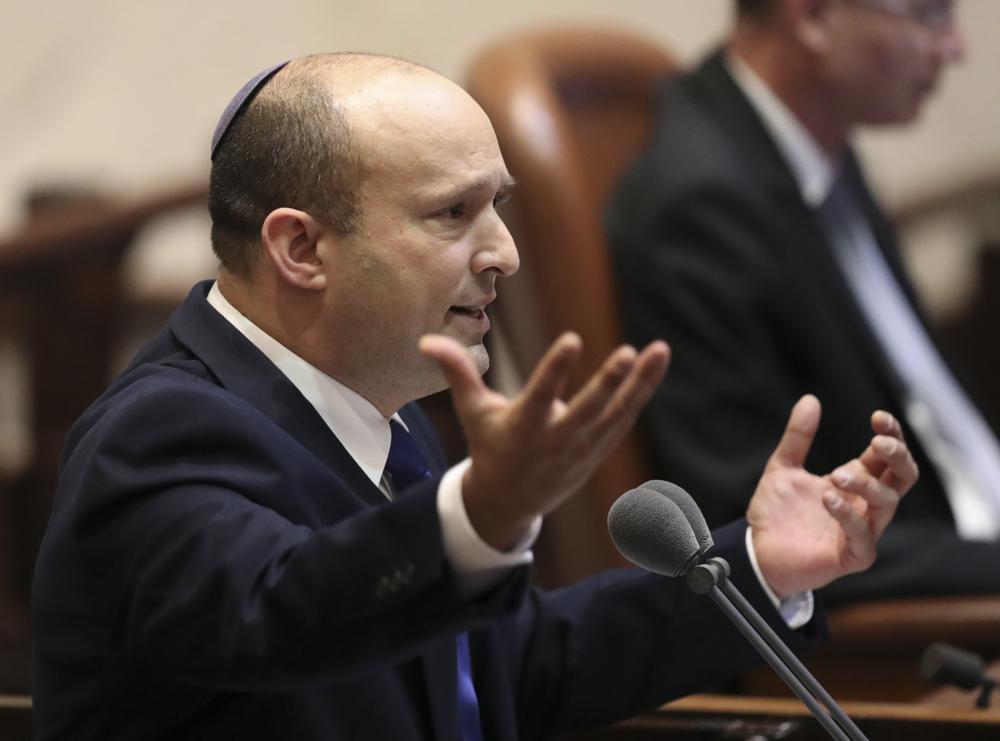
JERUSALEM (AP) — Israel’s parliament approved a new coalition government on Sunday that sent Prime Minister Benjamin Netanyahu into the opposition after a record 12 years in office and a political crisis that sparked four elections in two years.
Naftali Bennett, the head of a small ultranationalist party, was sworn in as prime minister after a narrow 60-59 vote in parliament. But if he wants to keep the job, he will have to maintain an unwieldy coalition of parties from the political right, left and center.
The eight parties, including a small Arab faction that is making history by sitting in the ruling coalition, are united in their opposition to Netanyahu and new elections but agree on little else. They are likely to pursue a modest agenda that seeks to reduce tensions with the Palestinians and maintain good relations with the U.S. without launching any major initiatives.
Netanyahu sat silently during the vote. After it was approved, he stood up to leave the chamber, before turning around and shaking Bennett’s hand.
Bennett’s speech mostly dwelled on domestic issues, but he expressed opposition to U.S. efforts to revive Iran’s nuclear deal with world powers.
“Israel will not allow Iran to arm itself with nuclear weapons,” Bennett said. “Israel will not be a party to the agreement and will continue to preserve full freedom of action.”
Bennett nevertheless thanked President Joe Biden and the U.S. for its decades of support for Israel.
Yohanan Plesner, president of the Israel Democracy Institute, a nonpartisan think tank, said the new government will likely be more stable than it appears.
“Even though it has a very narrow majority, it will be very difficult to topple and replace because the opposition is not cohesive,” he said. Each party in the coalition will want to prove that it can deliver, and for that they need “time and achievements.”
Still, Netanyahu “will continue to cast a shadow,” Plesner said. He expects the incoming opposition leader to exploit events and propose legislation that right-wing coalition members would like to support but can’t — all in order to embarrass and undermine them.
The new government is meanwhile promising a return to normalcy after a tumultuous two years that saw four elections, an 11-day Gaza war last month and a coronavirus outbreak that devastated the economy before it was largely brought under control by a successful vaccination campaign.
The driving force behind the coalition is Yair Lapid, a political centrist who will become prime minister in two years, if the government lasts that long.
He called off a planned speech to parliament, instead saying he was ashamed that his 86-year-old mother had to witness the raucous behavior of his opponents. In a brief speech, he asked for “forgiveness from my mother.”
The new government is expected to win a narrow majority in the 120-member assembly, after which it will be sworn in. The government plans to hold its first official meeting later this evening.
Netanyahu remains popular among the hard-line nationalists who dominate Israeli politics, but he could soon face a leadership challenge from within his own party. A less polarizing Likud leader would stand a good chance of assembling a coalition that is both farther to the right and more stable than the government that is set to be sworn in.
Copyright 2021. The Associated Press. All rights reserved.
The remainder of this article is available in its entirety at CBN